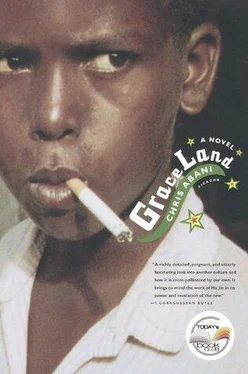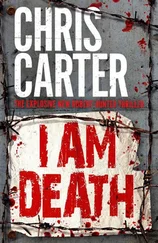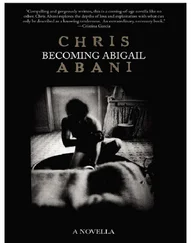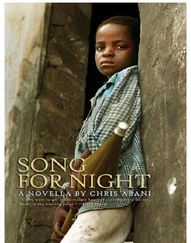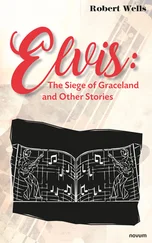As soon as she moved in, all the niceness vanished and he learned quickly that she had no time for anyone but herself — not his father, not him, not even her own children. Elvis initially forgave her abrasive manner because he thought she might shake his father out of his slump. And when Sunday began to go for job interviews, Elvis thought she had done just that. But he turned down the one firm offer he received when he found out that Comfort had bribed a member of the hiring committee with sex. Her nagging and their constant fighting drove his father further away from any career and deeper into drink. Their relationship had never made any sense to Elvis. He could not figure out why she had been attracted to his father in the first place, and why she stayed, except to torment them all. It had been Redemption who put it into perspective for him.
“A divorced woman with three children in dis society? Shit, dat’s a hard life. She needed your father to give her some kudos. Dat’s all. Simple. Now nobody can call her a harlot or wonder which man is supporting her. She only wanted de respectability dat being with a man can bring.”
At the time, Elvis thought perhaps Redemption was right; but if that was indeed all she wanted, why was she so mad, so clearly disappointed?
“Who cares? I’ve told you, dat’s all shit,” Redemption had said. “Dat’s bullshit,” he had repeated for emphasis.
“Elvis, when you go pay rent?” Comfort asked. Her voice, several octaves above normal, coupled with her stern demeanor, suggested she was expecting a fight.
“Good evening,” he said.
The implied insult over her lack of protocol did not go unnoticed.
“See dis small boy O! Don’t cheek me, just pay rent.”
“But this is not even your house,” he responded. “It is my father’s.”
“Does ya father have a job? Does he pay de rent? Pay or pack out,” she said.
“How much?” he asked. He did not have the energy for this.
“What?” Her reply betrayed her surprise. Either this tirade was not about the rent or she had expected more of a fight.
“The rent, how much?” he repeated.
“Three hundred naira,” she said.
He counted out the money from the roll held together with an elastic band and carried in his pocket. Handing it to her, he returned the rest to his pocket. She took the money and folded it into her bra and flounced out. He lay back and shut his eyes.
He was just about to drift off when his door squeaked open on rusty hinges. He sat up. Comfort was back, and when she did not move from her place at the door, Elvis looked at her with raised eyebrows, the way he remembered Roger Moore doing in The Saint.
“Ya papa no dey house,” she said.
“I know,” he replied. “So?”
“Elvis, I dey fear. He drink too much. More than before.”
“What are you afraid of?” he asked.
She shrugged. There was some silence. Then she spoke, her voice breaking slightly.
“Ya papa no love me.”
Elvis yawned. He couldn’t care less whether his father loved her or not.
“Na ya mama he love. Every night when he dey sleep, him go call her—‘Beatrice, Beatrice, soon, soon.’”
Elvis sat up.
“I dey fear say ya papa want to kill himself with drink,” she went on.
“My father hasn’t got the courage to do that,” he said.
“He want to kill himself to join ya mama. Only you fit help him.”
“Me? He doesn’t love me either, how can I help him?”
“Elvis,” she said, catching hold of his arm. “I never talk to you like dis before. I beg you be like son to him.”
Elvis was a mess of conflicting emotions. He’d been pretty sure that he hated his father, and now he had this strange urge to help him. He didn’t believe his father would actually kill himself, but he knew Sunday certainly had self-destructive tendencies. But why was Comfort telling him all this? What did she expect him to do? He felt the walls closing in on him. He shrugged off her hold.
“This is nonsense. I am going out now, excuse me,” he said, standing up and walking past her.
He had no idea where he was going, but after a while he realized that unconsciously he’d taken a bus to one of Lagos’s oldest ghettos, Aje. It was nothing like Maroko. It had no streets running through it, just a mess of narrow alleys that wound around squat, ugly bungalows and shacks. It occupied an area the size of several city blocks, and the main road ran to a halt at either side, ending in concrete walls decorated with graffiti. This was where Redemption lived.
It took Elvis a while to find Redemption’s tenement, a squat bungalow with rooms built around a paved courtyard. Across the street was a kiosk that sold everything from cigarettes by the stick to candy and liquor. In front of it, a man sat on a bench picking a tune out of a guitar whose appearance belied its rich tone. Stopping, he bought two beers and headed down the long corridor to Redemption’s rooms at the back.
“Madam, bring me one bottle!” Sunday shouted. “And one for everybody here!”
He hadn’t left the bar since he got there early in the morning. He looked around for Benji, but he was not there.
“Em, Mr. Philanthropist, before you give anoder person drink, pay for de one you done drink.”
“Haba, madam, why are talking like dis? It is me, Sunday de tycoon. When my numbers win lottery I will make you rich.”
“You never win lottery since de past twenty years, so why you go win it next week? Please pay me money.”
“Madam, dis is me, don’t be like a sourpuss.”
“Who are you? Money for hand, drink on de table. Simple.”
“Hah! dis woman wicked O!”
“I am wicked, eh …”
“Ah, not you, madam, I mean my wife.”
The madam of the bar smiled. She was very ready to extend credit to all her customers, who were mostly poor and unemployed anyway. But even her generosity had its limits, though she understood that they had come to drown their sorrows in her watered-down alcohol. They needed her and she needed them; they drank, she sold. If she was owed, she owed the palm wine supplier, who owed someone else; everyone owed someone these days, it was the vogue. But she needed to crack the whip from time to time just enough so that her customers did not take her for granted.
“Madam, how about one bottle on my account?”
“Which account? Dis place look like bank to you? Cash sale only.”
Sunday gazed stubbornly at the palm wine seller, who in turn tried to stare him down, but Sunday was used to this. They played it out every night and the palm wine seller always lost. He felt confident of victory. It was only a matter of minutes.
“You want to drink but you have no money,” she said, her resolve already weakening.
“We’ve got to start thinking beyond our guns,” Redemption said, slamming down his checker piece and picking up the three he had just killed.
“Damn!” Kansas said as he watched his pieces leave the board.
Elvis took a swig of beer. “What guns?”
“What guns?” Redemption repeated, his eyes never leaving the board. “Don’t you remember dat film, De Wild Ones?”
“ Wild Bunch ,” Kansas corrected, taking one of Redemption’s pieces.
“You’re sure it’s not Wild Ones? ” Redemption said.
“Want to bet?” Kansas asked with a crooked smile.
Redemption recognized the confidence in the smile and declined.
“But what has this got to do with my father and me?” Elvis asked, sounding more than a little frustrated.
“Crown me, crown me king!” Kansas shouted as he won.
“Fuck dis,” Redemption swore, getting up and letting someone else slide into his place. He had just lost ten naira. They were sitting in the backyard of Redemption’s tenement, where there was a money game every night. Kansas and Redemption were the usual winners, making enough to pay their rent.
Читать дальше
